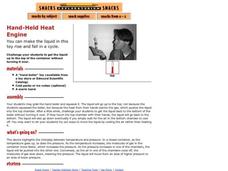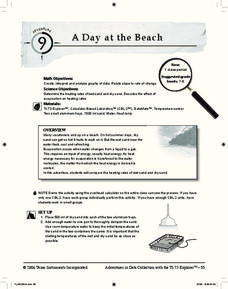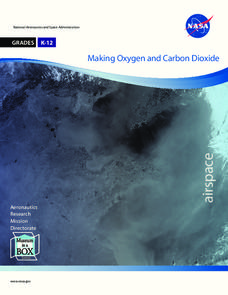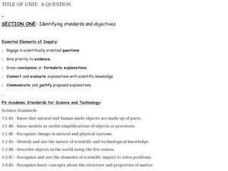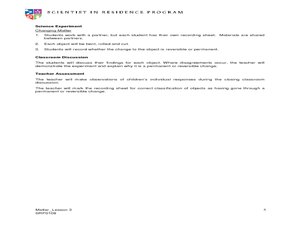Curated OER
Oxidation Reduction Reactions
In this chemistry worksheet, students find the outcomes necessary for the oxidation reduction reactions. The sheet includes background information.
K12 Reader
Plants Are Producers
Here's a handy two-part worksheet that uses an article about plants to assess reading comprehension. After reading the passage, kids answer questions based on the information in the text.
Exploratorium
Hand-Held Heat Engine
See the direct relationship between pressure and temperature using these classic science toys. As individuals hold the glass bulb, the liquid inside reaches it's boiling temperature, which is just a bit above room temperature. As the...
National Institute of Open Schooling
Solid State
Crystal comes from a Greek word meaning ice. Activity eight in a series of 36 has class members analyzing amorphous and crystalline solids and further classifying them based on their forces. They then explore solids, learning about unit...
Curated OER
What is Water?
Students examine water's properties. They participate in hands-on activities to show the properties of water.
Curated OER
Classroom Aquaponics: Exploring Nitrogen Cycling in a Closed System
Students investigate nutrient cycling in a simplified desktop ecosystem involving aquarium and hydro-ponically grown plants. They set up an aquarium with 10 gallons of water at least a week before the lab is planned and place...
Curated OER
A Day at the Beach
Help learners determine the rate of change for the temperature of sand. They will collect data on the temperature of wet and dry sand over time with a heat lamp overhead. Then make a scatter plot of the data and find a linear model to...
Curated OER
The Nature of Covalent Bonding
In "The Nature of Covalent Bonding," chemistry hopefuls demonstrate an understanding of various types of covalent bonds, electron configuration, and resonance structures through fill in the blank, true or false, and matching questions....
Curated OER
Chemistry: Real Life Chemistry (for the Business World)
In this real life chemistry worksheet, high schoolers are given 4 conversion factors and they solve 7 problems using the given conversion factors. They find the number of "widgets" and "watzits" needed to complete a "system". They find...
Curated OER
Chapter 12 Review, Section 1: Solutions
Here is a different approach to solutions: a worksheet that has chemistry learners use words to describe them! This is an outstanding exercise that will stretch learners to show what they know. They answer questions comparing solutions,...
Curated OER
Atomic Theory
An extremely thorough presentation walks new chemists through the basics of matter. There really isn't a unifying theme, however So many topics are covered: forces, elements, atomic structure, chemical properties, compounds, quarks,...
Curated OER
Relative Mass Formula, Atomic Formula, and Empirical Formula
After giving the definitions of the different compound terms and formulas, equations are provided to teach your chemists to calculate different values. Relative formula mass, atomic mass, and empirical mass are shown and explained with...
Curated OER
Excess Reactant
Junior chemists discover how to calculate excess reactants, handle limiting reactants, and determine percent yield. After background information is provided, step-by-step examples are solved. You can use this detailed slide show to teach...
K12 Reader
What’s in Your Cells?
Organelles, cellular respiration, ATP, and DNA. The passage attached to this life science reading comprehension worksheet is all about cells. After reading about diffusion and osmosis, kids answer a series of questions based on the text.
NASA
Making Oxygen and Carbon Dioxide
Some like it hot! Scholars observe both exothermic and endothermic reactions as part of the carbon dioxide oxygen cycle. First, scientists demonstrate (or watch) a chemical reaction to create pure oxygen using fire for confirmation....
Chemistry Collective
Osmotic Pressure: Spontaneous Balloon Popping
Visualize osmosis using an interactive activity. As learners monitor a simulation, they witness the particle movement through the membrane. A balloon represents the cellular membrane and 'pops' as osmosis creates an imbalance of particles.
Curated OER
"Why Is the Sky Blue?"
Learners investigate why the sky is blue and the sunset is red. They are asked why do you think that we see the sky as blue? Students write a hypothesis on their "Blue Sky Lab Sheet". They explain why they think that the sky is blue...
Curated OER
A QUESTION
Students engage in scientifically oriented questions. They give priority to evidence, draw conclusions/formulate explanations and connect/evaluate explanations with scientific knowledge. Students communicate and justify proposed...
Curated OER
Moles
In this moles worksheet, students review solubility, moles of solute, molar mass, and colligative properties. This worksheet has 10multiple choice questions and 11 problems to solve.
Curated OER
The Mole
This compact collection of slides explains the history and use of the mole unit. Relative atomic mass, as John Dalton understood it, is explained. Avogadro's number is also introduced. The mole, or the unit for the amount of a substance,...
Curated OER
How Substances Get in and out of Cells
Although it contains some formatting issues, the Word document here contains good questions about osmosis and diffusion, and is easy to edit as needed. Designed as a study guide, you could use the information here for warmups, ideas for...
Curated OER
Physical Changes to Matter
Pupils explore matter by conducting an in-class experiment. They experiment with water's various forms by melting and freezing water, identifying its new shape. These observations are recorded to supplement later discussion. They also...
Curated OER
Carbon Cycle Capers
Students examine the carbon dioxide cycle in the atmosphere. In this element lesson, students discuss the relationship between carbon dioxide on Earth and the plants that store it. Students play a game to ensure their understanding.
Curated OER
Photosynthesis: An Overview
This photosynthesis quiz containing multiple-choice and short-answer questions challenges young biologists to extend their thinking beyond knowledge recall. There is one question referring to a certain page in the unidentified textbook,...




